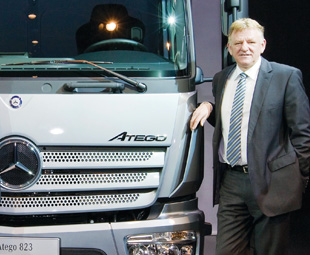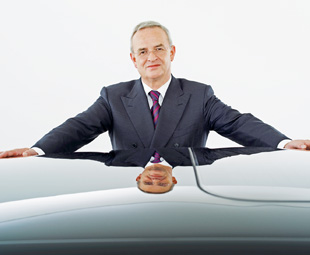Revealed: Skeletons in the VW/ Scania/MAN closet!

Things are extremely interesting at Volkswagen right now. The rumour-mongers are having a field day, with accusations of insider trading and poaching of senior executives flying fast and furious …
The life and times of Volkswagen read like a soap opera. Occupying centre stage is Prof Dr Martin Winterkorn, chairman of the board of management of Volkswagen AG. A determined man, he’s accustomed to getting his way.
And right now, The Winterkorn Way is all about creating and nurturing a massive commercial vehicle grouping, comprising Volkswagen Commercial Vehicles, MAN and Scania – to take on Daimler. (The Winterkorn Way is also about being the number one car maker in the world, but that’s another story entirely …)
There are a number of challenges with the commercial vehicle giant. One would be getting arch rivals – Scania and MAN – to work together, or cooperate at the very least. That’s not a prospect that appeals to either company; here in South Africa and elsewhere in the world the two manufacturers fight tooth and nail for business, often wooing the same operators.
Winterkorn is, of course, aware of this situation, but he’s determined to make it work. “The commercial vehicle business is increasingly evolving into a second strong pillar for the group,” he confirmed at Volkswagen’s annual media conference and investor conference in Berlin last month.
He seems upbeat about prospects for all three brands. “Volkswagen Commercial Vehicles is successfully driving forward its internationalisation. The brand recorded significant growth in North and South America, as well as in Asia. Scania remains highly profitable, despite headwinds. Moreover, the brand has positioned itself well for the new Euro-6 standard: With an impressive 15 different Euro-6 engines, Scania is one of the technology leaders here. MAN is also investing in innovations. The brand launched new Euro-6 engines in all of its series in 2013. And the world’s largest solar power plant in Abu Dhabi also relies on technology made by MAN,” he told the 300 journalists who had converged on Berlin from around the world.
But Winterkorn is determined for even better results from these three brands, and one of the ways he aims to achieve that success is via greater synergies. He has already proved that this can work with the passenger car brands. “Take the example of Porsche, where we can point to extremely positive growth in cooperation in the fields of development, procurement, production, finance and distribution. We will achieve considerably greater synergies than previously assumed. Instead of €700 million (R10,4 billion) a year, we are now anticipating mid-term synergies of more than €1 billion (R14,9 billion) a year in the Group,” he explained.
Now Winterkorn wants to achieve the same with the commercial vehicle brands. “We can expect an average long-term synergy potential of at least €650 million (R9,7 billion) in operating profit per year,” he revealed.
But, in order to achieve these synergies, Volkswagen needs to have absolute control – something that hasn’t applied to Scania in the past (the German company owns about 89 percent of Scania’s voting rights and nearly 63 percent of share capital). Hence, in February this year, Volkswagen offered US$9,2 billion (R98,7 billion) to acquire all shares in the Swedish company.
Volkswagen believes that its offer of 200 kronor (R338) per share is generous – but not all Scania shareholders agree. Scania formed a committee to investigate the share offer and its recommendations weren’t exactly rosy. “Based on the long-term prospects of Scania, its growth outlook, technological excellence and the synergy potential, the committee believes the offer does not reflect the long-term fundamental value of Scania and a fair share of the expected synergy potential, and recommends to Scania’s shareholders not to tender their shares,” the company proclaimed in a media statement.
The issue should be resolved by April 25, when the share offer expires. However, another issue – considerably more controversial – could take longer to resolve. According to news agency Reuters, eight cases of suspected insider trading are now being investigated. A spokeswoman for the Economic Crime Authority (Ekobrottsmyndigheten) told Reuters that the probe concerned millions of kronor. However, she declined to elaborate on what sparked the investigation.
 “Prosecutors have taken the decision to look at it more closely. The prosecutor has said it’s a matter of millions of crowns (kronor). We cannot be more precise than that,” the spokeswoman said.
“Prosecutors have taken the decision to look at it more closely. The prosecutor has said it’s a matter of millions of crowns (kronor). We cannot be more precise than that,” the spokeswoman said.
At the same time, substantial share purchases by Scania CEO, Martin Lundstedt, and chief financial officer, Jan Ytterberg, were reported just three weeks prior to the Volkswagen offer. According to business daily Dagens Industri, Lundstedt stood to profit by 1,7 million kronor (R2,88 million) if the takeover bid went through. Ytterberg would profit to the tune of half a million kronor (R850 000).
There are strict legal requirements in place in Sweden; because of their positions of privilege, Lundstedt and Ytterberg would have had to report any changes to their shares portfolio to Sweden’s Financial Supervisory Authority. But, according to its trade survey unit head, Johan Allstrin, reporting the trade would not have absolved the duo. “If you have insider information, you cannot act based on that information regardless of whether you report the transaction to us or not,” he told the TT news agency.
Journalists at the media conference were speculating that, if the Volkswagen bid proved to be successful, Lundstedt and Ytterberg would be axed. But Winterkorn says this is not on the cards. “If our offer is successful, one thing definitely remains unchanged: Scania will stay Scania! We are totally committed to Scania’s workforce and Scania’s jobs. We are committed to Scania’s plants and development centres. We are committed to Scania’s headquarters staying in Södertälje.
“I’m convinced that everybody will benefit from the integrated commercial vehicles group – and in particular the Scania brand, its employees and its customers. And we are committed to Scania’s very special corporate culture, which makes this brand so strong. Scania will continue along its successful path, without restriction, under the leadership of Martin Lundstedt. I believe that the Volkswagen Group has frequently demonstrated how strong brands can be successfully integrated – while, at the same time, letting them have the necessary freedom and independence. Porsche is a good example here,” Winterkorn told journalists.
The Swedes clearly disagree – which is why they aren’t enthusiastic about the generous share offer (it carried a 50 percent premium over trading value). They aren’t buying the “without restriction” thing. This is understandable; when you spend R98,7 billion on something, you tend to want to run the party.
Addressing this lack of enthusiasm will fall on the broad and capable shoulders of one Andreas Renschler, who suddenly resigned as head of manufacturing and procurement at the Mercedes-Benz car group earlier this year. (He was in charge of the truck business from 2004 to 2013.) Industry commentators were amazed and rumours of poaching were prevalent; Renschler was widely tipped to succeed Daimler CEO Dieter Zetsche. The reality is that Renschler was probably just fed up with the wait to become CEO.
 Be that as it may, Renschler was suddenly not star-struck. And, when Volkswagen approached him and suggested he join the company as head of its commercial vehicle group, he jumped at the chance. Alas, his jubilation was short-lived; Daimler insisted that Renschler honour the terms within his employment contract … practically this means that Renschler’s arrival at Volkswagen has been delayed to February 1, 2015.
Be that as it may, Renschler was suddenly not star-struck. And, when Volkswagen approached him and suggested he join the company as head of its commercial vehicle group, he jumped at the chance. Alas, his jubilation was short-lived; Daimler insisted that Renschler honour the terms within his employment contract … practically this means that Renschler’s arrival at Volkswagen has been delayed to February 1, 2015.
Winterkorn is nonetheless elated. “For years now, the Volkswagen Group and its brands have been attracting the best brains in the industry. Another outstanding individual who will soon be coming to Wolfsburg is Andreas Renschler. He will play a major role in continuing the successful work done by Leif Östling (previous head of commercial vehicles) and will lead our commercial vehicles business to pole position in the industry,” he announced at the media conference.
Some believe that a year-long wait is too long – even for someone of Renschler’s calibre. One journalist at the media conference even asked (rather rudely) what made Renschler so special, and queried his tactical abilities when it came to the integration of Scania. Winterkorn was unfazed. “He has almost 10 years of experience in trucks and buses worldwide, and he was employed on the recommendation of Östling. They have the necessary diplomatic talent to integrate Scania. I am confident that we will be successful in this regard,” he responded.
So there you have it: all the skeletons in the cupboard. Will Volkswagen take full control of Scania? Will it be able to integrate the business – or will we have another unhappy marriage – à la Daimler and Chrysler? Will MAN and Scania hold hands and play nicely?
I don’t know. But one thing is certain: for now, the Volkswagen/Scania/MAN family will remain in the news.
Published by
Focus on Transport
focusmagsa




